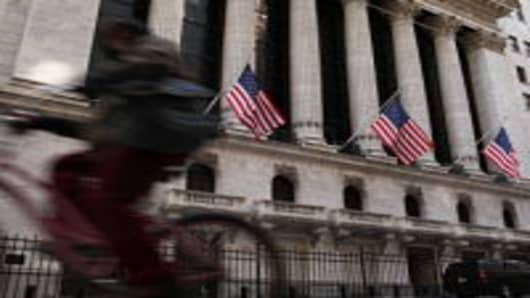If oil markets remain calm, Fed chairman Ben Bernanke's comments on the economy, auto sales and ISM manufacturing data could have more sway over markets on Tuesday.
The Middle East Mondaytook a back seat to other market forces, including month-end portfolio shuffling, which helped push stocks higher into the closeand should provide a lift to stocks Tuesday.
The stock market closed out its third month of gains and its best February since 1998, despite several weeks of unsettling news from Libya and elsewhere in the Middle East. Oil Monday was $0.91 per barrel lower at $96.97, after more assurances from Saudi Arabia that it would boost production.
The Dow was up 95, or 0.8 percent at 12,226 Monday, and is up 2.8 percent for the month of February. The S&P rose 7 points to 1,327, giving it a 3.2 percent gain for the month. Treasury prices were higher on the day Monday but the underperformer was the 10-year. It was yielding 3.416 percent.
"The story is probably a little bit of a money flow story. You rallied right at the close and you have a lot of pension funds that put money to work at month end," said Barry Knapp, head of equities portfolio strategy at Barclays Capital. "I think people had been looking for a correction to go short, and last week gave them that. Then they got squeezed on Friday, and they got squeezed again today."
Knapp has not been expecting a major stock market correction, and he still doesn't. He said the rise in energy prices may be similar to what it was like when Hurricane Katrina shut down Gulf of Mexico production and refining. "You did have a sustained spike in energy prices that flowed through to gasoline. Non durable goods took a hit because of that, but the economy didn't overall. You were in the middle of a business cycle. You had a lot of momentum, and the economy continued to chug along. I think that's the situation we are in now," he said.
Knapp on Monday actually upped his forecast for the S&P 500 to 1450 for year end, from 1420. He also raised his outlook for S&P 500 earnings to $93 from $91 per share for 2011. As for sectors, he downgraded consumer discretionary stocks to underweight but upgraded industrials and put a higher market weight on financials.
Knapp made his earlier forecast three months ago. "The further you get, the more confidence you have. This is a relatively bad thing to get a spike in energy prices and disruption into the Middle East, but it could turn out to be pretty temporary. Also the economy is pretty resilient to these things," he said.
"Our tip of the hat to that risk was in part to lower the rating on the consumer discretionary sector," he said.
Fed Chairman Ben Bernanke appears before the Senate Banking Committee for the first of two days of Congressional testimony on the economy at 10 a.m.
Deutsche Bank chief U.S. economist Joseph LaVorgna said in a note Monday that he expects Bernanke to react to rising oil prices. "...we expect him to express that high oil prices will elicit greater caution with respect to the economic outlook, meaning that all else being equal, rising oil will prompt the Fed to keep rates "lower for longer" in order to assure a self-sustaining expansion," he wrote.
Traders are watching to see if Bernanke gives any new insights into the Fed's quantitative easing program, which three Fed officials questioned in the past several days. They are also looking to see how Bernanke discusses energy and inflation, and whether he sees inflation as a rising threat. Previously, he has said deflation is now less of a risk but unlike other central bankers around the world, he saw no inflation threat for the U.S.
Separately, LaVorgna also lowered his GDP forecast for the the first quarter from 4.5 percent to 3.8 percent and the full year from 4.3 percent to 4.1 percent. LaVorgna made the changes because Monday's January personal consumption was weaker than anticipated, especially after revisions. Spending was up 0.2 percent and December was revised lower by 0.2 percent to 0.5 percent. He said inflation adjusted consumption fell 0.2 percent so he trimmed his first quarter consumption estimate by a full point from 3.5 percent.
Tuesday's data includes ISM manufacturing, expected to come in at 60.9, up just slightly form 60.8 in January, the highest rate since 2004. ISM also saw all of its components move higher and at levels above 50. Citigroup said, in a note, that the reading has only been that strong three times in 30 years and therefore, their expectations are that the ISM could see a slight reversal.
Regional surveys, like the Philadelphia Fed survey, have been strong so traders expect ISM to show continued strength. The Philadelphia survey, reported last week, was at its highest level since January, 2004.
The employment component of the ISM is also watched because it will be giving clues as to the state of manufacturing hiring ahead of Friday's February non farm payrolls.
ISM is reported at 10 a.m., as is January construction spending. Auto sales are released by auto makers throughout the day ,and are expected to show an annualized selling rate of 12.6 million, unchanged form last month.
Treasury Secretary Tim Geithner testifies at 10 a.m. before the House Financial Services Committee on mortgage finance reform.
Egypt's stock market reopens for the first time since protesters helped topple the Mubarak government.
There are a few earnings expected Tuesday including AutoZone , BMO Financial , Center Point , Charter Communications . After the bell, Tivo and McDermott report.
- Follow me on Twitter @pattidomm.
Questions? Comments? Email us at marketinsider@cnbc.com



